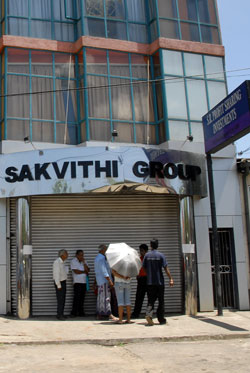
The Sakvithi office |
|
By Lakwi Perera
It seems the Sri Lankan public have not learned their lesson after the recent GoldQuest and Sea Gulls scams as the gullible public was once again duped by promises of unbelievable returns for investments this week, when Sakvithi Ranasinghe, fraudster extraordinaire, flew the coop with nearly a billion rupees of hard earned money that was invested in his “financial institution” by the unsuspecting public.
Director of the Department of Supervision of Non-Bank Financial Institutions of the Central Bank, S.S. Ratnayake, told The Sunday Times FT the laws in place at the moment prevent the Central Bank from taking any sort of action. The current Act, the Finance Companies Act was enacted in 1988. “Financial systems evolve over time,” the Director said, adding that the current Act prevents the Central Bank from restricting services or even taking action against advertisements placed by such dubious companies. “Sometimes, some of these companies file action in court, just to delay the investigation by the Central Bank,” he said.
Mr. Ratnayake pointed out the necessity of amending the existing legal framework to empower the Central Bank to do more, adding that these amendments are in the final stages before implementation.
In 2003 the Central Bank published a list of 37 unauthorized financial institutions as a public announcement. As a result of this, some of the institutions filed action against the Central Bank and the court ruled that the publishing of names was harmful for business for the organizations. Since then, the Central Bank has been publishing regular notices to the public listing out the financial institutions that are authorized to accept deposits.
Most of these institutions display the number they obtain when registering the organization as a company, but doing so does not sanction accepting deposits. In order to avoid the application of the law, Mr. Ratnayake said that these companies avoid the use of the word “deposit” and instead phrase them as “investments”, “debentures” and “fund management”.
Currently a deposit of Rs. 200 million must be made to register as a finance company. Most of these so called unregistered “finance companies” lack the capital, systems and controls and the necessary human resource in the form of qualified directors. The businesses are run recklessly. They operate by servicing old deposits with funds coming in from the new deposits. Once the inflow of cash ceases, the system crashes and the public lose their money.
The Central Bank has instituted action against 30 such companies, in areas such as Kandy, Hambantota, Anuradhapura, Kurunegala as well as in Colombo where unauthorized companies are engaged in deposit taking. “Deposit is defined in a broad term in the Act so we take action against anyone who seems to be breaking the law,” he said. |
